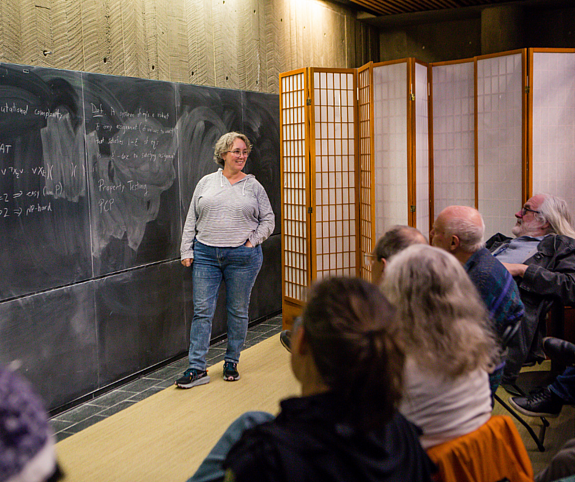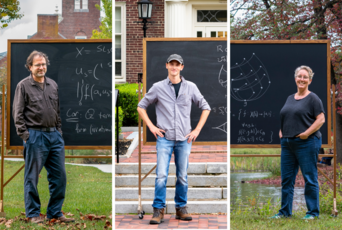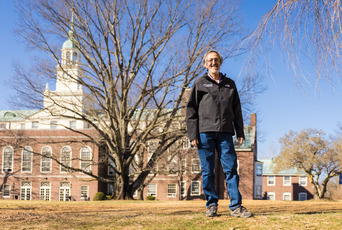Betsey Lombard Overdeck Theory of Computing Professorship Established in the School of Mathematics
Press Contact

The Institute for Advanced Study, where generations of theoretical advances laid the foundation for digital computing as we know it today, is creating a new professorship in the theory of computing, supported by a gift from John Overdeck, the chair of the Institute’s Board of Trustees.
The Betsey Lombard Overdeck Theory of Computing Professorship, in the Institute’s School of Mathematics, will be held by Irit Dveer Dinur, a preeminent theorist in computational complexity and other questions at the heart of the computing revolution that has defined our era. Dinur joined the Institute Faculty last fall.
The new professorship signals the Institute’s commitment to continued global leadership in the theory of computing—a field that has generated some of the Institute’s most transformational discoveries over the last 80 years, and one that is more important to human advancement than ever, with breakthroughs in artificial intelligence, quantum computing, and more.
“The Institute for Advanced Study has a distinct role to play in the unfettered exploration and creation of human knowledge—laying the theoretical foundation for scientific advances that benefit humanity, while examining the attendant questions of ethics and meaning,” said David Nirenberg, IAS Director and Leon Levy Professor. “John Overdeck’s generous gift gives us new momentum to advance a field of enormous importance to our past and to our future.”
The professorship is named for John Overdeck’s late mother, Betsey, who lectured part-time in mathematics and computer programming at the University of Maryland and a local community college while she raised her two sons. She went on to lead a team that developed ground communications software for the TDRSS geosynchronous satellite constellation, launched by NASA in the 1980s.
“I am honored to support the theory of computing program, and I am excited for Professor Dinur to be the inaugural professor,” John Overdeck said. “I can think of no better way to honor my mother’s memory than to connect her name to this extraordinary legacy of innovation in computing.”
From its founding, the Institute for Advanced Study has been home to some of the world’s greatest mathematicians. In 1945, Professor John von Neumann added a new dimension by applying that theoretical prowess to his Electronic Computer Project, developing a logical structure that served as the basis for subsequent stored-program computers. In the basement of Fuld Hall, von Neumann and a team of engineers and technicians built this new kind of digital computer, freely distributing the technical details throughout academia and industry, so that it quickly became the prototype for future generations of computers.
In 1999, Avi Wigderson, Herbert H. Maass Professor in the School of Mathematics, established the Computer Science and Discrete Mathematics (CSDM) program, extending Institute’s legacy as a leading center for computational research. Wigderson is also the first person to receive both the Abel Prize and Turing Award, a testament to his field-shaping work and the power of mathematics in computing.

Researchers at the Institute have also grappled with topics ranging from artificial intelligence to human-computer interaction.
Dinur previously spent time at IAS as both a Member (2001–02) and Visiting Professor (2019–20), when she temporarily led the Institute’s CSDM program.
She has made numerous transformative contributions to the study of computational complexity, publishing groundbreaking work on optimization, expansion of graphs and hypergraphs, coding theory, and differential privacy. Her work on probabilistically checkable proofs (PCPs) was recognized with the 2019 Gödel Prize. She has also received the 2012 Erdős Prize in Mathematics and the 2021 ACM Paris Kanellakis Theory and Practice Award.
Dinur returned to the Institute in 2024 from the Weizmann Institute of Science in Israel.
“This new commitment to theoretical computer science is a great way to further support the connection between pure mathematics and theoretical computer science, building on the many years of the Institute’s leadership in this direction,” she said.
About the Institute
The Institute for Advanced Study has served as one of the leading independent centers for theoretical research and intellectual inquiry since its establishment in 1930, advancing the frontiers of knowledge across the sciences and humanities. From founding IAS Faculty Albert Einstein, Erwin Panofsky, and John von Neumann to influential figures Emmy Noether, George Kennan, and J. Robert Oppenheimer to the foremost thinkers of the present, IAS is dedicated to enabling independent inquiry and fundamental discovery.
Each year, the Institute welcomes more than 250 of the world’s most promising post-doctoral researchers and scholars who are selected and mentored by a permanent Faculty, all of whom are preeminent leaders in their fields. Among present and past Faculty and Members, there have been 37 Nobel Laureates, 46 of the 64 Fields Medalists, and 23 of the 27 Abel Prize Laureates, as well as winners of the Turing Award; the Pulitzer Prize in History; the Wolf, Holberg, and Kluge prizes; and many MacArthur and Guggenheim fellows, among other honors.


